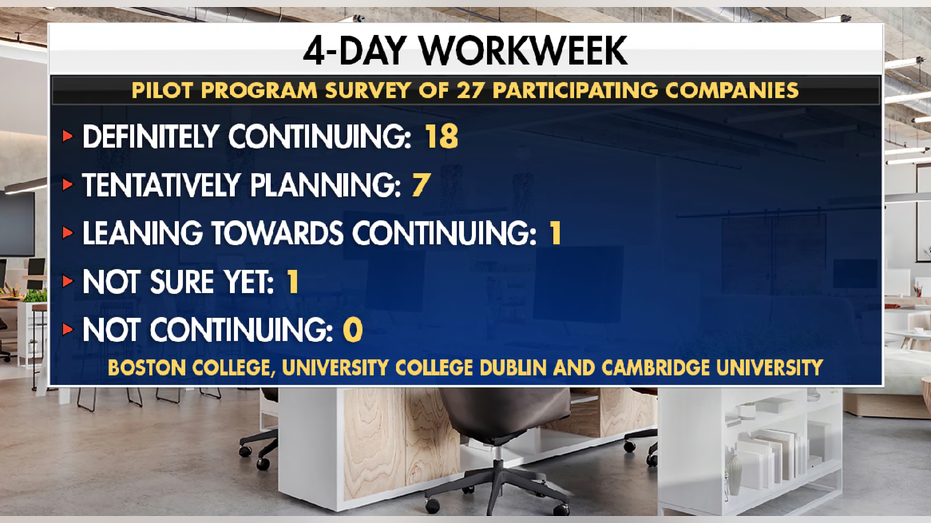Four-day workweek gaining steam, restaurant, manufacturing industries say it doesn't work
As the four-day workweek gains momentum, it is not a one-size fits all model across all industries
Americans share their thoughts on four-day workweeks
FOX Business' Lydia Hu discusses the growing push for a four-day workweek and what Americans think of the shortened shifts.
There is a growing push to make Thursday the new Friday, but not everybody is on board.
A six-month pilot program in the U.S. and Ireland recently concluded and shows that nine out of 10 companies that tested out a shorter week say they will not go back. Roughly 27 companies that underwent the study shrunk the work week without reducing pay for more than 900 employees.
Researchers say the results reveal benefits to workers’ health and productivity, including lower burnout rates, stress levels, staff resignations and sick days.

JOB OPENINGS DIPPED IN JANUARY BUT REMAIN HISTORICALLY HIGH
Despite the high percentage of participating companies that want to continue this new format, it is not a one-size-fits-all model across all industries.
American Plastic Toys Inc. President John Gessert tested out a 4-day workweek by distributing two extra hours across the four days, but it did not work out as expected. Productivity fell off after the typical 7.5 to 8-hour shift.
"It was a net loss for activity per hour," Gessert told FOX Business. "It was hard on the employees. I know we’re concerned about their mental health, but overall, the extra work in a short period of time turned out to be a negative, and the productivity loss far outweighs the positive gains from going to a four-day [week]."
American Plastic Toys are sold on Amazon, Big Lots, Dollar Tree, Walmart and Walgreens, among other discount chains, and shipped out to vendors five days a week.
Stocks In This Article:
With the company’s five factories and machines operating and running across Michigan and Mississippi five days a week, Gessert said that absorbing the costs of overhead has an impact on the bottom line.
"Even if we weren't manufacturing and actually assembling or molding products, most of our large customers require shipping availability at least five days a week," Gessert said.
While some businesses are experimenting with redistributing the regular 40 hours to four days instead of five, proponents of standardizing an abbreviated workweek are pushing for 32 hours without a reduction in pay. In Maryland, the first-of-its-kind bill would offer tax credits to encourage businesses to switch to a 4-day workweek. Rep. Mark Takano, D-Calif., is sponsoring a bill that would require companies to pay overtime when an employee works more than 32 hours per week.
LAYOFFS SIGNAL LABOR MARKET RECALIBRATION
Some business owners equate the format to wage inflation and say this would require double staffing or limiting resources.
"Asking to take another 20% reduction in just productivity and competitiveness would either require double staffing, which is not practical or not pragmatic, isn't doable," Laura Rea Dickey, CEO of Dickey’s Barbecue Pit, told FOX Business. "It would add unnecessary cost, and there isn't a genuine benefit."
Dickey’s workforce staff has not been fully staffed in three years since the pandemic started, and job listings remain open. For the fast-casual restaurant and the largest barbecue franchise in the United States with over 500 locations, maximized productivity and output from employees is needed to make the business work again, according to Dickey.

Dickey's Barbecue Pit.
In the restaurant and service industries, where wait staff and hosts often rely on tips to supplement pay, one less day of work means less income. Some workers prefer to work more not just to bring home more revenue, but also because of the sense of community, belonging and gratification that a workplace brings.
OVER 25,000 GLOBAL TECH WORKERS LAID OFF SINCE START OF 2023
The concept of a shortened workweek is not new.
Companies began testing out a four-day, 40-hour workweek in the United States in the early 1990s. In Utah, the state government experimented with the four-day schedule from 2008 to 2011.
Now, the rise of remote work and labor shortages accelerated amid the pandemic have placed a new premium on mental health and creativity among employers to find candidates.
"I think people should have objectives. Once you meet your objectives, if you can do it in two days instead of four, so be it," a business pilot told FOX Business.
Other pedestrians told FOX Business that it would enable more time to be spent with family and friends and help to boost more energy for the week ahead.
CLICK HERE TO READ MORE ON FOX BUSINESS
"I would actually focus a little bit more on my personal life that I tend to neglect," one woman who works in consulting told FOX Business. "Having that little time back to yourself can really help with personal as well as getting yourself ready for the next week."
Yet, economists are also skeptical that workers can maintain the same levels of productivity with 20% of the work time slashed.
Daniel Hamermesh, professor emeritus of economics at the University of Texas and author of a new study about the rise of the four-day workweek, argues that workers are not 100% productive during each minute of the work day anyway and that there are very few jobs where workers can produce the same amount in total while working 20% less.
"If a 32-hour week were widespread, the U.S. would produce less, would have lower GDP, and lower living standards," Hamermesh told FOX Business. "No problem, if people want more leisure and are willing to forego some income. But we can’t have more leisure time—less work—and keep the same income. We can’t get something for nothing."
Nonetheless, the four-day workweek is gaining steam, particularly among younger workers who are entering a workforce that is employee-centered.
The U.S. study conducted by Boston College, University College Dublin and Cambridge University shows that more than 40% of workers who tried the truncated workweek said they would want a raise by 26% to 50% if they were forced to go back to five days a week.




















